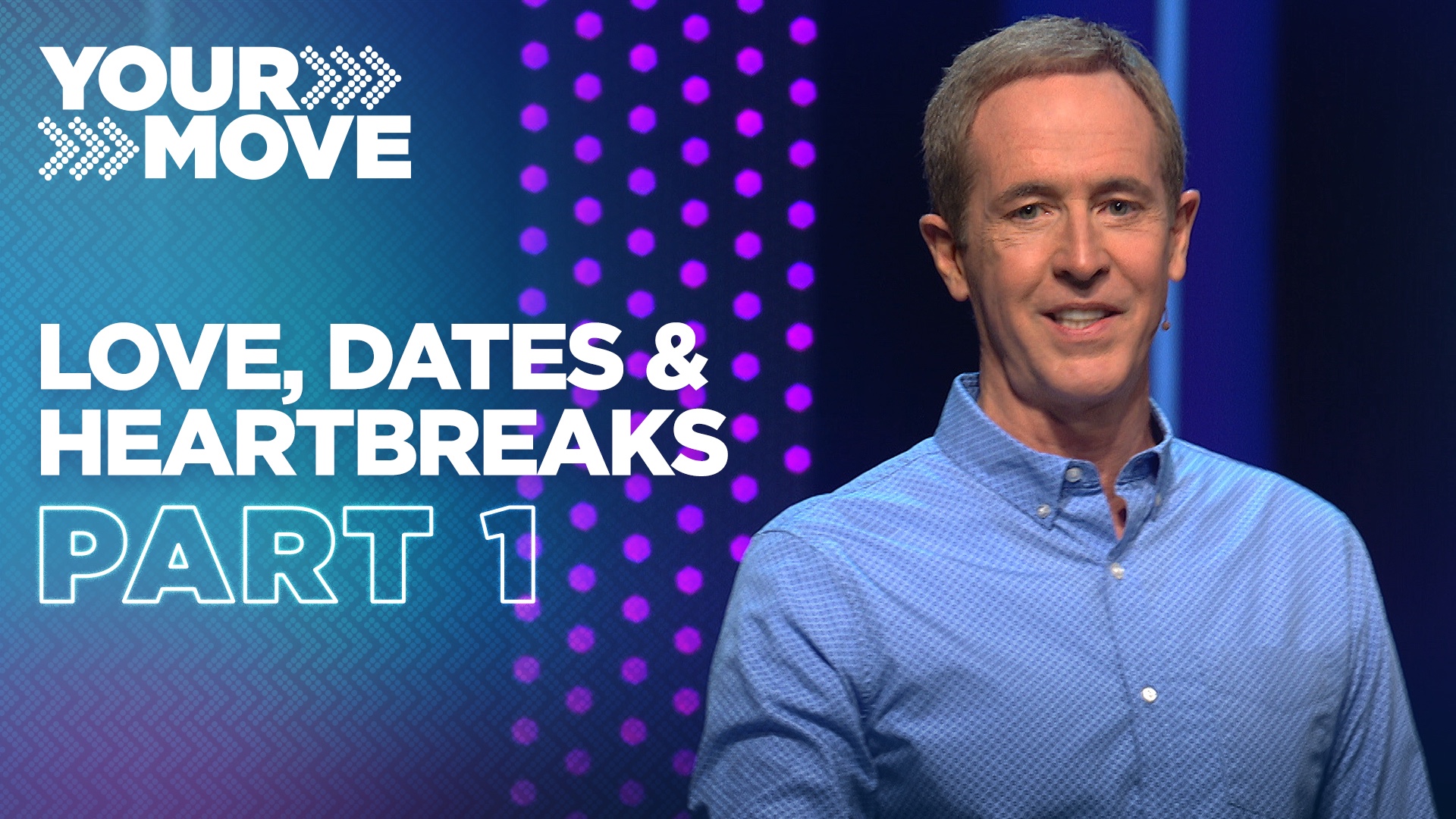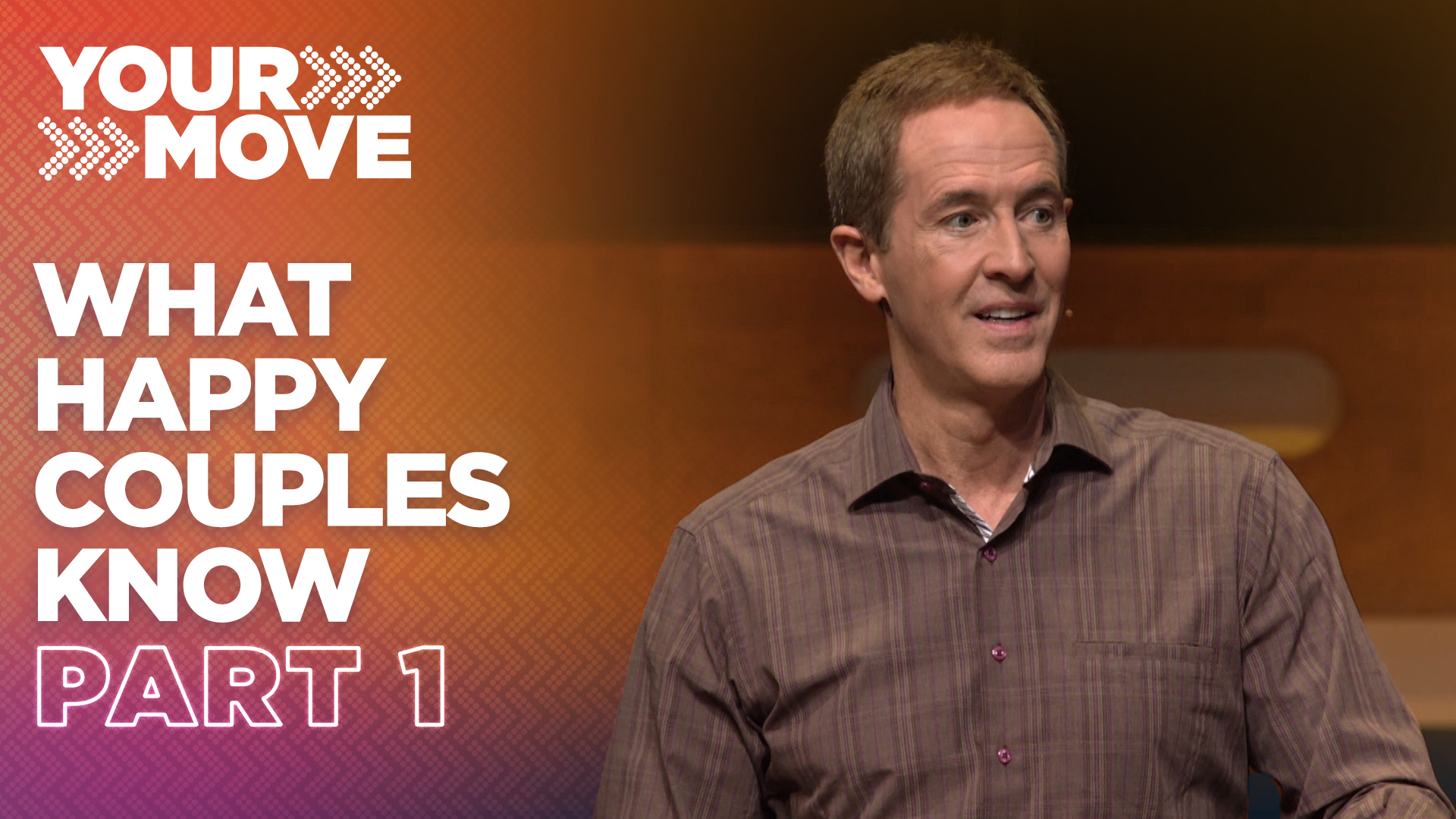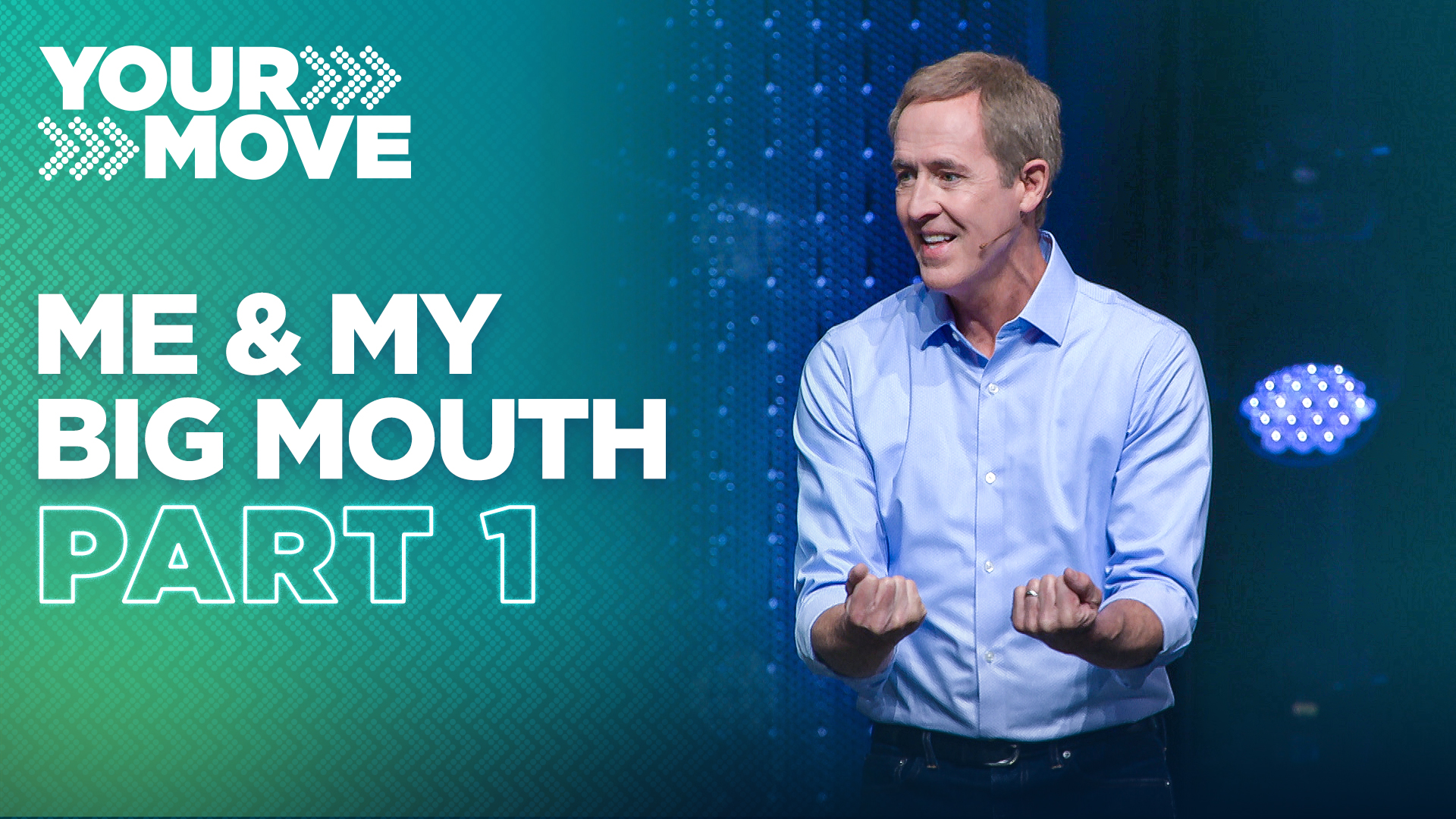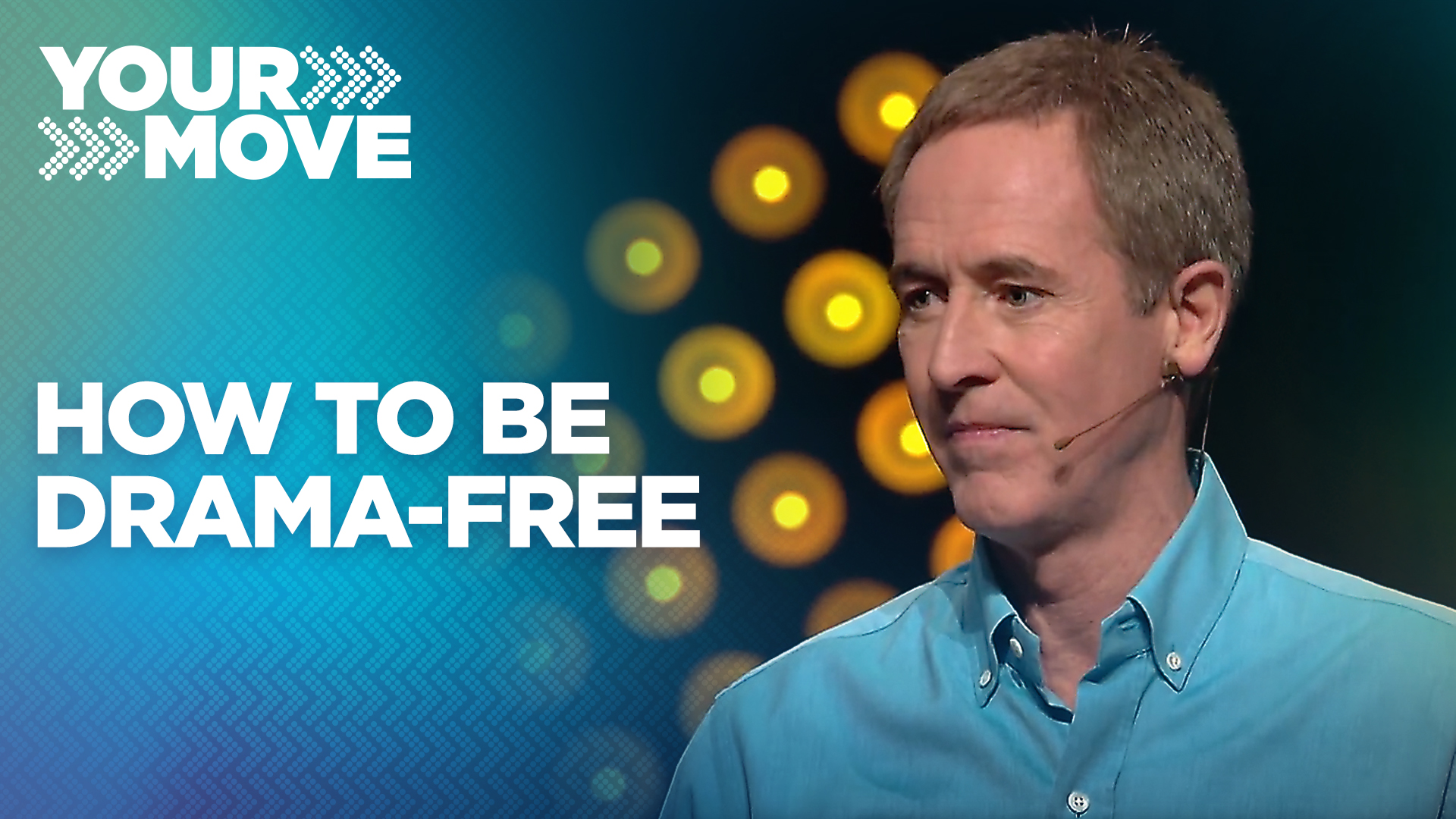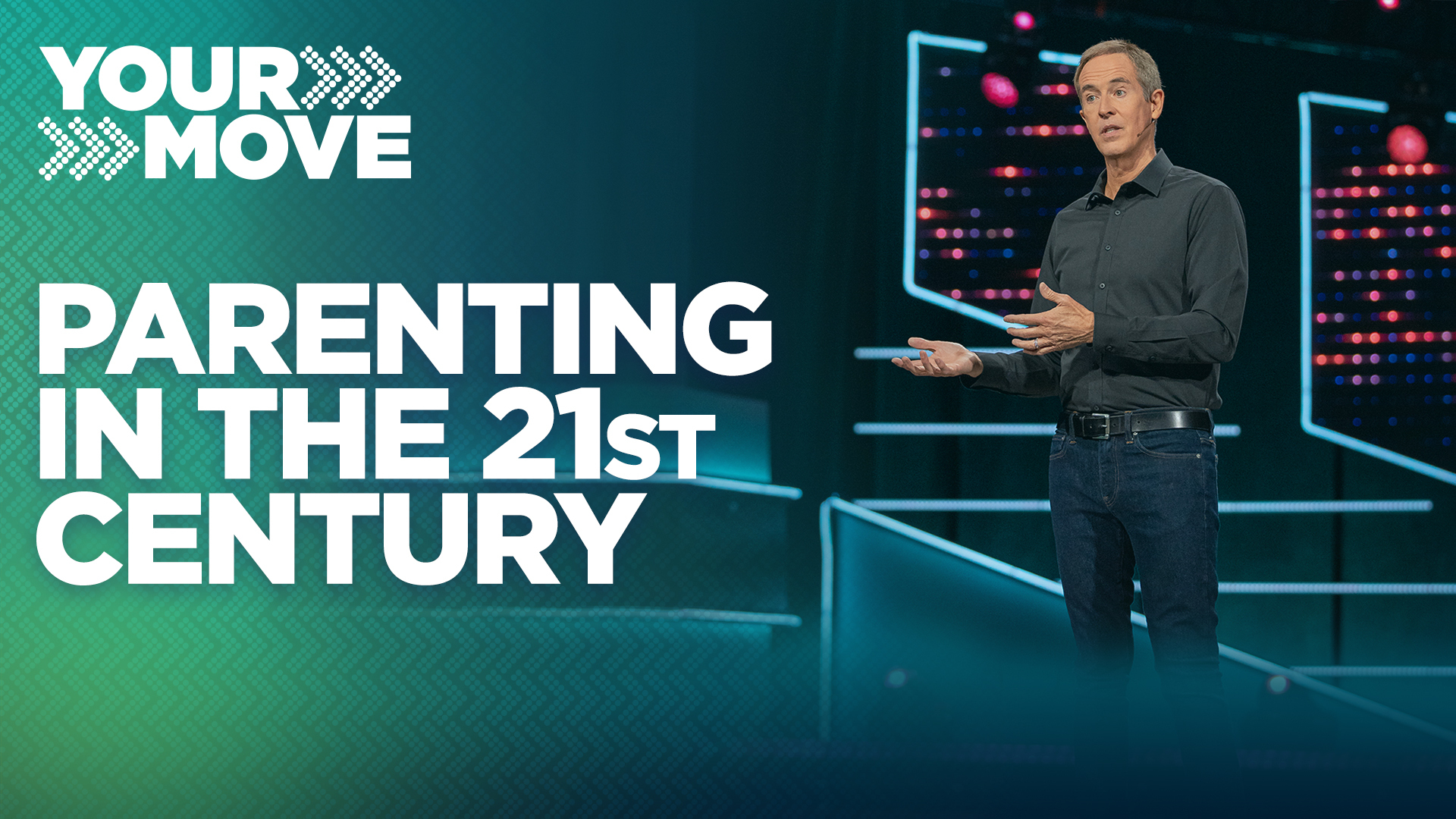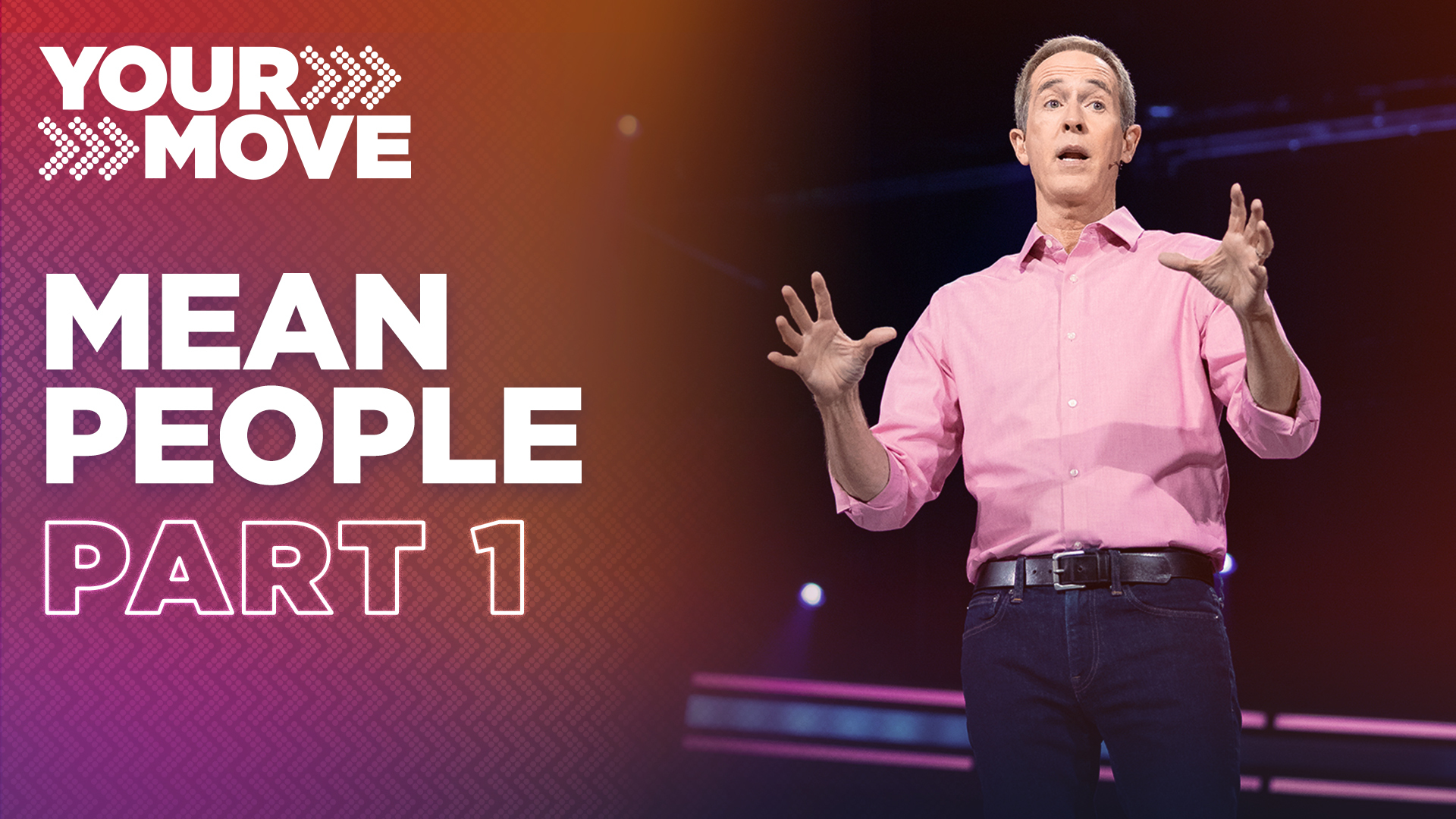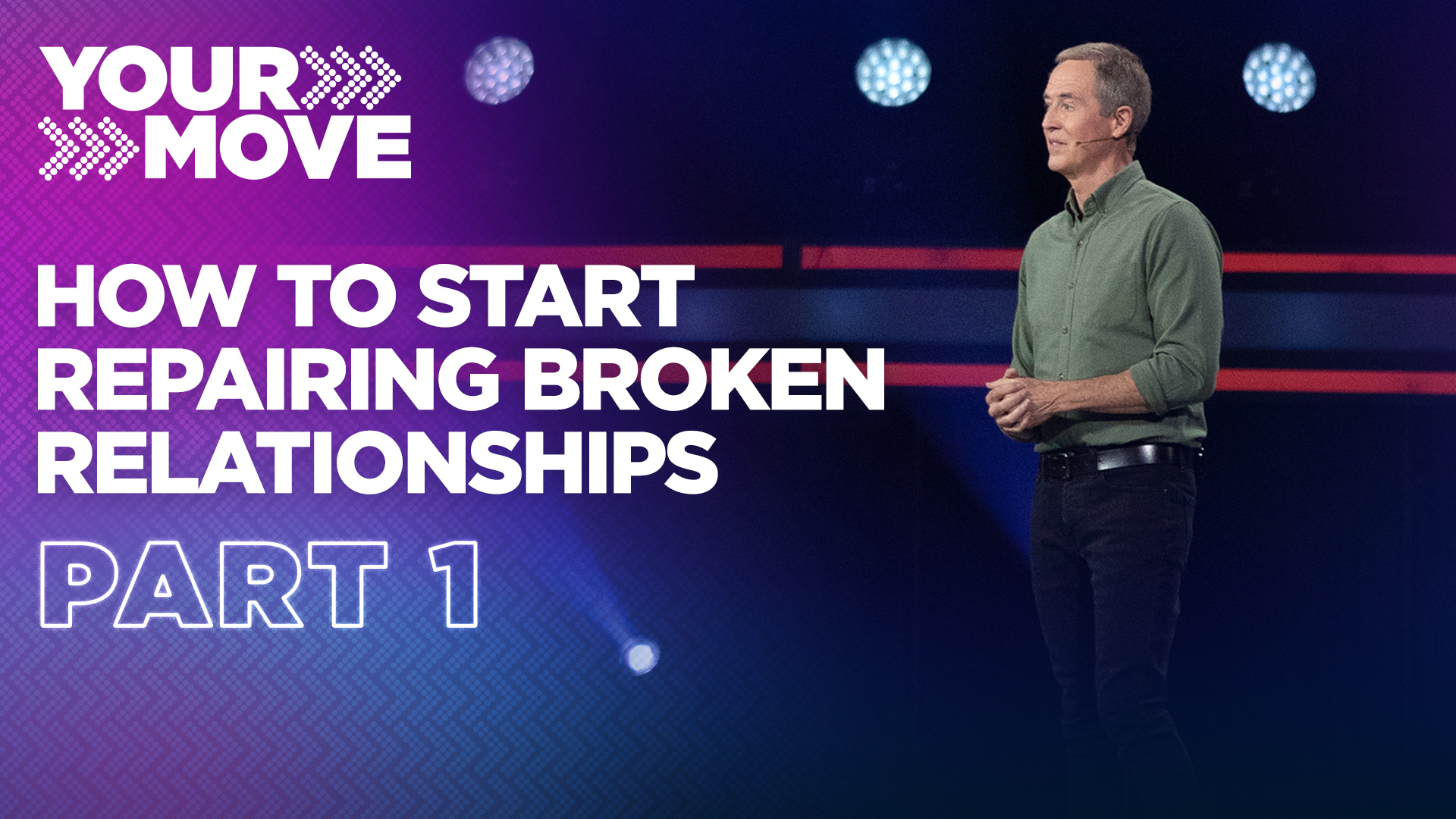What goes around often comes around. When we find ourselves in positions of power over the people who have hurt us, how will we respond?
- Have you ever ended up with power over someone who previously mistreated you? How did you respond? Do you wish you had responded differently?
- How can Joseph’s response to his brothers affect how you make choices with your words in the future?
- “Bad things have been happening to good people for a long time. But God has been with good people in bad times for a long time as well.” Does this statement impact the way you understand why “bad things happen to good people”?
- In which ways could being “quick to listen and slow to speak” help you avoid saying things you later regret?
NOTE: The following content is a raw transcript and has not been edited for grammar, punctuation, or word usage.
So today we are wrapping up our series, Me and My Big Mouth. And I’d like to emphasize Me and My Big Mouth because I’m so glad this series is over because I have felt so accountable and I’ve been trying to think of something to talk about in our next series that’s a lot easier for me to apply. But this is difficult for all of us. In fact, right out of the gate, James, the brother of Jesus, which is such a cool thought that we have a letter or a document, a 1st century document from James, the brother of Jesus. He gives us the bottom line and we’ve talked about this, we’ve repeated this and so this is our last time to look at this together for a while. He said… And I don’t know how you improve on this, I don’t know how it could get any better, his bottom line, our bottom line for this series was really simple. It’s we are to be quick to listen and slow to speak. Quick to listen, slow to speak.
Then last week, we looked at a passage where the Apostle Paul actually gave us a couple of word pictures. He said, Let no unwholesome word come out of your mouth. And so we decided that we were all gonna try to avoid fishmouth. We were all gonna try not to be this guy. No distasteful, dishonoring, disrespectful words. Because if you’re not even a religious person, I mean this is just good advice. I mean, this is how you want people to talk to you for sure. but then he gives us another word picture that’s really helpful. He said, we should approach every conversation as if it is a construction site, and that our words are actually building materials. That as a result of talking as when we walk away from conversations, when we walk away from construction sites, people should be better off, they should be built up.
And then he got up in our business a little bit, and the Apostle Paul says, “Hey, I need to kinda go to the root of what is the issue for some of you. And he says, “You, if you’re gonna get this right, you must get rid of all bitterness because it’s difficult to be a builder if you’re bitter.” And of course, the way you get rid of bitterness is forgiveness, and forgiveness is deciding that someone in the past doesn’t owe you. It’s deciding, “I’m gonna give someone in the past what they don’t deserve. So I can give the people around me now what they do deserve.” That’s what forgiveness is.
And if we are able to gather up our bitterness and our anger and take it to the street and leave it there, then we become… We have the potential to become the heroes in our own stories. And the reason this is such a big deal, I mean you know they’d hurt people. What do they do? Oftentimes, they hurt people, bullied people, have a tendency to bully people, neglected sons become absent fathers, neglected sons become demanding husbands, abandoned daughters become suspicious wives, and on, and on, and on it goes.
We have the potential of being the hero in our own story because of something I wanna talk about today. Because every once in a while and for more people than you might think, and maybe this will be part of your story even though you cannot imagine this being a part of your story when you think about your current story. Every once in a while, what goes around comes around, and the powerless find themselves in a position of power. The people who hurt you may someday need you, and how you leverage your words when the people who hurt you need you, how you leverage your words in those moments says more about you than anything else. And I want you to be ready.
Now, if you started reading your Bible at the very beginning in Genesis, it’ll take you a long time to get to Jesus. But if you start in Genesis, you’re not there for too long before you run into a guy named Abraham, and that’s where our story begins. God appeared to Abraham or spoke, rather, to Abraham and said, “I’m gonna make you into family that becomes a nation and through you I’m gonna bless the entire world.” And Abraham and Sarah had to wait a while, but they finally had a son named Isaac and then Isaac eventually had two sons and one of them was named Jacob.
But it doesn’t look like much of a nation. In fact, it’s not even much of a family. And then suddenly things pick up steam because Jacob had 12 sons. And suddenly we’re on the verge of some tribes and suddenly we’re on the verge of maybe two or three, four generations later you’ve got a small nation, especially by ancient standards. But the interesting thing about this story is that the entire enterprise, the entire promise to Abraham, God’s goal for what he wants to do with this plan of redemption for the whole world through the centuries, the entire plan would end up hanging by the thread of one person’s words.
In fact, the entire enterprise could have easily fallen apart based on a single sentence from one single person. And that one single person actually was one of Jacob’s sons and his name was Joseph. Now, Joseph was Jacob’s favorite son because he was the son of Jacob’s favorite wife. He had two wives and a couple of other ladies he had had children from. So here’s a takeaway for today. Men, never have a favorite wife, okay?
[laughter]
It will cause problems. And it caused so many problems for Jacob ’cause he had a favorite wife named Rachel and then Rachel gave birth again to a boy they named Benjamin but she died in childbirth. So he was constantly mourning the loss of his favorite wife, and consequently Joseph became his favorite son. So, Benjamin’s too young to be a part of this narrative but Joseph had these, for the most part, older brothers, we think, and all 10 of these older brothers despised him and resented him because they knew their father loved him more than he loved the rest of the boys.
So, as the story goes, and if you grew up in church, or if you’re Jewish, you know the story. One day Jacob says to Joseph, “I want you to go check on your brothers,” which Joseph hated to do and the brothers hated it even more. And so Joseph shows up and they see him coming and they said, “You know what? We’ve had enough of this. This is ridiculous.” They take Joseph, they strip him of his robe, the special robe that his father had made for him, and they throw him in a pit. That was an empty pit, it wasn’t full of water but it wasn’t a pleasant place to be in, they decided, “You know what? Let’s kill him but before we kill him, let’s have lunch.” So the text says, “They sat down, they sat down to eat their meal. And they looked up and they saw a caravan of Ishmaelites coming from Gilead.” the text says, Judah said to his brothers when they saw this caravan going by, “What will we gain? What good is it to us if we kill our brother and cover up his blood?” And they’re like, “Yeah, good point.” “Come,” he said, “Let’s sell him to the Ishmaelites and not lay our hands on him.” And then this flood of compassion, “After all, he is our brother.” And all 10 went, “Mm-hmm, he is our brother.” And then their compassion left. “And he’s our own flesh and blood.” So they pull him out of the pit, of course, he’s terrified, just terrified, he doesn’t know what’s gonna happen. And then he sees these strangers and they’re speaking foreign languages, plural, and they tie him by his hands and they sell him. They sell their own brother to these slave traders.
Now, Joseph at this point is 17 years old, he’s a teenager, and he is being sold to slavers. He doesn’t know who he will end up with and he doesn’t know what he will be purchased for. The text continues, “Now Joseph had been taken down to Egypt, and Potiphar, an Egyptian, who was one of Pharaoh’s officials, the captain of the guard bought him from the Ishmaelites who had taken him there.” And then perhaps the strangest part of the story, in fact, this is repeated throughout, it’s the theme of the story. And in the midst of all of this chaos, the author tells us, “And the Lord was with Joseph so that he prospered.” And we think, “No, if the Lord was with Joseph, Joseph would be home with Jacob and it would be the 10 brothers that would be sold into slavery, right?” Because Joseph hasn’t done anything wrong. The wicked brothers are getting by with something horrible.
Well, eventually Potiphar notices Joseph is a very talented person. And before long, after a few years, Joseph is managing Potiphar’s household. And Potiphar wasn’t the only person that noticed Joseph, Potiphar’s wife noticed Joseph. And Potiphar’s wife comes to him and says to him “Slave,” because he’s a slave. “Slave, I require your presence. I require you to sleep with me. This isn’t an ask. I’m commanding you. I own you and slave, I want you young man to sleep with me.”
And for the first time, perhaps, in her whole life, she got a “no” for an answer. And the reason he gave is amazing, the first reason was, “Look, your husband has put everything he owns in my charge, under my authority except for you. So how can I do this?” But then, this next statement is amazing. He says, “How then,” he says to her, to Potiphar’s wife, “How then could I do such a wicked thing and sin against God?”
Well, this goes on day after day, after day, after day and he’s like, “No, no, no, no, I’m not gonna do it.” And finally, she’s had enough and she accuses Joseph of trying to rape her. When Potiphar finds out, he has no options. In the text is, “Joseph’s master, Potiphar, put him in prison, the place where the king’s prisoners were confined.” And then again, the author brings us back to this theme, “But. But. But while Joseph was in the prison, the Lord was with him.” To which we say, “No. See, if the Lord is with you, you’re not in prison, she goes to prison.” Okay? The whole thing is… This is not working. Aren’t good things supposed to happen to good people? And aren’t bad things supposed to happen to bad people? And if you’re faithful, isn’t it all supposed to work out? The text says, “And God, He showed him favor in the eyes, He granted him favor in the eyes of the prison warden.”
Well, eventually, Joseph eventually becomes somewhat of the administrative assistant to the warden; he’s running the whole prison. He just got extraordinary administrative skills.
Well, as the story goes, Pharaoh’s butler and Pharaoh’s baker fall out of favor with Pharaoh and Pharaoh has them thrown into the same prison. And of course, they meet Joseph and time goes by. Again, years go by. And one day, the text tells us, and it’s funny that one day they wake up and they see Joseph and Joseph can tell they’re down. And Joseph says to them, “Hey, I can tell something’s going on. What’s going on?” They both said, “Well, we both had dreams and these dreams were so vivid and so real, we feel like they mean something, and we’ve talked about it and we just don’t know what these dreams mean.” And Joseph says, “Well, give me a shot. I’ve in the past been able to interpret dreams.” So, they tell Joseph their dreams and first the butler goes, he says, “Well, I had this dream,” and Joseph listens to the dream and he says, “Well, I’ve got some good news. In three days, it’s Pharaoh’s birthday, and on Pharaoh’s birthday he’s gonna lift up your head and restore you as his personal butler and wine taster.”
And then Joseph says this, it’s so honest, he says, “But when you’re free, tell them about me. I was kidnapped from my hometown, I was kidnapped from my people, I’ve done nothing wrong, I do not deserve to be here. I want someone on the outside to know I’m here and to get me out of here.” And of course, the butler’s thinking, “Well, yeah, if this dream comes true and I’m restored, of course, I’ll remember you.” Well, the baker’s listening to all this, he’s like, “Wow! That was good news. Hey, what about me?” So he tells his dream to Joseph and Joseph pauses and says, “Well, your head will be lifted up too, off your body unfortunately.”
[laughter]
Well, sure enough, three days later, one of them is beheaded and impaled and the butler is restored.
And put yourself, if you can, it’s difficult for us to be in this situation, imagine, and a day goes by and Joseph is thinking, “Maybe this is the day, surely. Surely the butler’s gonna say to someone on the outside, ‘Oh, you’re not gonna believe this, there’s a guy in our dungeon who predicted this very event.'” And two days go by, and three, and a week, and a month, and the text tells us that the butler forgot all about Joseph. And for some of us, that’s our life story right now, isn’t it? We just feel forgotten. And a year goes by, and another year goes by, and another year goes by, and for all Joseph knows this is his lot in life for the rest of his life. But day after day after day, he continues to live as if God is with him.
Now, Joseph is 30 years old and Pharaoh has a series of dreams. And he’s so disturbed by these dreams and they’re so vivid and he believed that somehow they mean something so he calls in the court magicians and he calls in his counselors and he shares this dream and nobody can come up with an interpretation for these dreams. And then the butler remembers and he says to Pharaoh, “Pharaoh,” these are my words, not the text. “Pharaoh, you remember a few years ago, we had that little… it wasn’t a big deal, it wasn’t a really big deal, but you did have me… I hate to even bring it up, but you had me thrown in the dungeon for a very short time ’cause it wasn’t a big deal. Anyway, while I was there I met a Hebrew slave and he listened to my dream and told me what would happen based on my dream.
So the text says that Pharaoh sent for Joseph and he was quickly brought from the dungeon. And when he had shaved, because he was a mess, and when he had changed his clothes because he smelled like dungeon, he came before Pharaoh.
And Pharaoh said to Joseph, “I had a dream and no one can interpret it, but I have heard it said of you that when you hear a dream you could interpret it.” Now, what happens next is perhaps the most courageous phrase, the most courageous statement uttered by anyone anywhere in all of history. He says, “I cannot do it.” Joseph replied to Pharaoh, “But God will give Pharaoh the answer he desires. O Pharaoh, you are little g god, but big G God can answer your request.” Well, Pharaoh had to have been offended. Everybody in the courtroom’s offended. Get a stake ready, but Pharaoh’s like, “You know what? I want somebody to tell me what this dream means.” So he said, “Here’s the dream,” he explains it to Joseph. Joseph pauses. And Joseph explains to Pharaoh what the dream means. And here’s what the dream meant.
He says, “Pharaoh, the reason you had a sequence of dreams is because God is establishing the fact that this is going to happen and the dreams mean the same things. Egypt is gonna experience seven extraordinary years. There is gonna be so much grain, your people are gonna be swimming in grain. People from all over the world are gonna come here and purchase your grain. It’s gonna kill the economy probably ’cause the prices are gonna go so low, there’s gonna be so much grain. But after those seven years, there’s gonna be a famine and the famine is gonna be so bad, that just a short time into the famine, everyone will have forgotten about all the abundance. It’s gonna be so bad. And so that’s the interpretation of your dream. Seven years of prosperity, seven years of famine.” At which point, Joseph should have stopped talking, but then Joseph does the unthinkable. Joseph begins to give Pharaoh advice. At which point, everyone in the courtroom must have moaned. This kid still smells like dungeon, and he leans in and he says, “Pharaoh, here’s what you ought to do.”
“Here’s what you need to do,” and he kept going. During the years of plenty you need to designate certain cities in the country as granary, grain cities. You need to build extraordinarily large silos and you need to tax the people 20% of all the grains. So for the next seven years, you collect 20% of all the grain and… ” And here is the kicker, “and you are are to do this Pharaoh in your name.” Pharaoh’s like, “Okay, shhh, keep going. This is good.” “Then after the seven years when the famine hits and the rain stops and the crops die and the locust come, then at the right time, somebody needs to pay attention, you’re gonna open these grain silos. These cities where all these stores of grain are, and don’t give it away, sell it to the people.” Pharaoh’s like, “I see where this is going. Keep going.” “Sell it to the people and this is gonna be such a big, complicated thing, you’re gonna need to find somebody to put in charge of this ’cause somebody cannot take their eye off this ball for the next seven years. Somebody needs to wake up every single day for the next seven years working on this and then managing it on the back end.” Silence.
‘The plan seemed good to Pharaoh and all his officials.” It sure did because by the end of this story and we don’t have time to go into the details. By the end of this story, Pharaoh personally owned the entire nation. Personally. Because by the end of the famine, it was so severe, people began trading their cattle, their land, their slaves, for grain. And guess who owned it all in the end? So Pharaoh asked him, “Can we find anyone, like this man, one in whom is the Spirit of God?” Now, when Pharaoh asks a question and he telegraphs what he wants the answer to be, everybody in the courtroom gives him the answer he wants because he’s a god. Then Pharaoh said to Joseph, “Since God has made all of this known to you, not only what’s gonna happen but what we should do about it, there is no one so discerning and wise as you. You shall be in charge of my palace.” “He’s gonna be in charge of my palace, all my people they’re to submit to your orders. Only with respect to the throne will I be greater than you.” And he makes Joseph the Prime Minister of Egypt.
Joseph gets to work. We know he’s efficient. He trained in Potiphar’s household, but he didn’t know he was training. And he gets to work and he builds the storehouses, and he chooses the city, and he organizes the whole thing. And for seven years they tax the grain and 20% of the grain is stored seven years’ end. And I mean, the rain ceases and things get really bad. In fact it was so bad, everybody forgot, as he predicted, they forgot about the good years. And at the right time, when the time is right, they begin to sell the grain and people spent all their money on grain and they traded their cattle. And this famine reached outside the borders of Egypt all the way north to where Joseph’s family lived, and they begin to feel the effects. And the text says that when Jacob, Joseph’s father, learned that there was grain in Egypt, this is funny, he said to his sons, the other 10 sons plus Benjamin, “Why do you just keep looking at each other? We’re starving to death.” He continued, “I have heard that there is grain in Egypt. Go down there and buy some for us so that we may live and not die.” In other words, “Why do I even have to… Guys, come on, we’re gonna die, you’ve gotta go down there and buy some of this grain.” So the boys load up, and they head to Egypt. And the stage is set. And the fortunes have been reversed.
Now Joseph was the governor of the land, the person who sold the grain to all these people. Well, look at there. And apparently the boys showed up in the very city where Joseph just happened to be on that particular day, dispensing and overseeing the dispensing of grain. So, when Joseph’s brothers arrived, they bowed down to him with their faces to the ground. And as soon as Joseph saw them he recognized them, but he pretended to be a stranger. And they did not recognize him. And do you know why they did not recognize him? Because he walked like an Egyptian.
[laughter]
That’s why. [laughter] They didn’t recognize Joseph because he’s 30 years old, and the last time they saw him he was a scrawny little teenager probably, who was terrified. And the last they heard of him was him begging for mercy, and they just erased all that from their minds. And now they are in the presence of the second most powerful person on the planet as far as they were concerned.
So here’s the question we all have to wrestle with, and some of you are not wrestling with this now, but you will in the future. I just want you to be ready. What do you do when you’ve got the power and your words determine the destiny of your enemy? What happens when things turn around? When what goes around came around? What happens when you’ve got the power and your words determine the destiny of your enemy? And the answer to this question depends upon what you did with your bitterness and your anger. And if you are still dragging it around when this happens, you will be like the people you don’t like.
And as these boys were bowed down before him, I’m sure the things that went he just remembered. Those nights with the Ishmaelites hearing them laughing by the camp fire, wondering, “Where am I going? What’s happening to me?” Who knows what happened to him, or how he was treated along the way. The prayers that weren’t answered. Standing on that auction block stripped naked with people walking around checking him out from every angle deciding who should purchase him, what he was worth and what he would be good for, what he could be used for. The lie told by Potiphar’s wife just when things at least were in some semblance of order and a life that he could possibly survive and being thrown once again into the dungeon. And there before him, are the men responsible for all of that.
And the text says, as this whole story escalates, and there’s so much detail, months go by. And finally they’re all back in Egypt, and he gets them in a room and he has his attendants and his guards, and then he does something that completely freaked them out. The text says that Joseph could no longer control himself before all of his attendants and he cried out, “Have everyone leave my presence,” and suddenly they are alone in the room with this guy who has given them so much attention and they just can’t figure out why has he singled us out? And Joseph said to his brothers, he’d been waiting for this. “I am Joseph.” And they wetted themselves.
[laughter]
Okay, that’s not in the text but I…
[laughter]
Their bowels released.
[laughter]
Because they expected him to do unto them what they had done unto him. With one word, 10 stakes in the courtyard to be impaled. That’s what awaited them. Joseph said, “Is my father still living?” That’s it. “Is my father still… ” He had no idea what was happening back at home. But his brothers, of course, this makes perfect sense, but his brothers were not able to answer him because they were terrified in his presence, because they were rehearsing as well what was said and what was done and what would probably happen to them. But they did not need to be terrified in his presence because Joseph had lived as if God was with him during his absence, and he kept bitterness at bay.
What Joseph could not have known was that God’s plan for the ages dangled by the thread of his one word. That before him sat the 10 tribes of the 12 tribes of Israel through whom God would introduce the Savior of the world, who would do for the world exactly what Joseph ultimately did for his brothers. forgive them. Because he didn’t carry around a bag of bitterness and a sack of anger, even though he had every reason in the world to do so. Here, he has them stand up, embraces all of them and says, “You’re to go home, you’re to get dad, you’re to get your family, your grand family, I want you to bring them all back and I’m gonna care for you for the rest of your lives.” And he does.
And years go by, and then Jacob their father dies and the ten get together and go. “Uh-oh, that’s what he was waiting for. He got us here, we have been his hostages all along, he was just waiting for daddy to die and whence daddy dies, now he’s going to exact his vengeance on us.” And his brothers, the text says, they came to him and they threw themselves down before him and they said, “We are your slaves. We sold you into slavery. If you’ll spare our lives, if you will spare our children’s lives, if you will spare our grandchildren’s lives, and the lives of our people we are your slaves.” But Joseph said to them, “Do not… ” This is so powerful, “Do not be afraid.” And then here’s the question that you’re gonna have to ask yourself at some point in your life, “Am I,” Joseph says, “in the place of God?” Not, “Am I God? I know I’m not God, but am I in the place of God?” So listen to this. You will never experience the good that comes from the bad unless you recognize God was with you during the bad and then refused to play God when things are good.
You will never experience the total good that can come from the bad unless you live during those hard tough years as if God is with you and then you refuse to play God when things are good. Joseph said, “You, you intended to harm me, but God’s bigger than that. And God was silent, but God wasn’t still. It seemed like God was far away, but God was working. But God intended it for good to accomplish what is now being done; the saving of many lives. So then, don’t be afraid. You’re not my slaves. I’m not gonna simply not execute you, I’m gonna provide for you and your children.” And he reassured them, and he spoke kindly to them. And here’s the thing, one day, maybe one day soon, you may have power over the person or the persons who took from you, who hurt you, who harmed you, who stole that first marriage, who stole your childhood, who stole the opportunity you had to raise your own children. You don’t know what’s gonna come around.
And in those moments, you’ll remember what they took from you, and you will remember what they did to you. And in that moment, your Heavenly Father is going to invite you to remember something else as well. He’s gonna ask you to remember who was with you. And in that moment, you have a decision to make, what will you do? What will I do when we’ve got the power and our words, your words determine the destiny of your enemy? Will you pay them back or will you use those words to pave the way forward? Your decision will not be determined by what’s happening then, your decision will be determined by what you do between now and then. It will be determined by the perspective you maintain between now and then. And I hope that you will take your cue from the one who gave his life to you, and not from the one or the ones who took life from you, from the one who was with you and not the ones who abandoned you. And if you do, in that moment, you will be like your Father in heaven. And you will be free.


